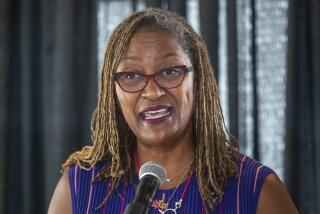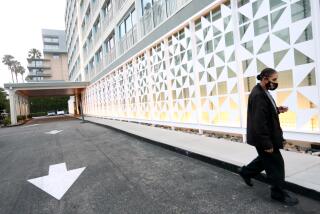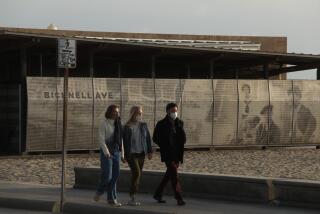A deep tide of goodwill at Bruce’s Beach
- Share via
Bernard Bruce looked much like a family patriarch presiding over a grand picnic as he relaxed on a park bench Saturday morning. Children turned somersaults and shot hoops in the midday sun. Their parents and friends milled around Bruce, shaking his hand.
“I feel comfortable,” he said as he gazed out over the sands of Manhattan Beach. “It’s a great day.”
For Bruce, 72, of Los Angeles, Saturday was a homecoming of sorts. More than 80 years after city leaders evicted his grandparents from the resort they owned there, city leaders held a ceremony to dedicate the park as Bruce’s Beach, in honor of Charles A. and Willa Bruce, who founded the region’s first beach resort for African Americans.
About 250 people came to hear speeches by Bruce and city officials, who praised the couple as pioneering entrepreneurs.
“This is a happy day for my family and me,” Bruce told the crowd. “It is a happy day for Southern California, for African Americans and for the whole country. We are remembering our past.”
This was only the second time that Bruce, a retired teacher, had visited the spot where his family once lived.
He was born several years after the eviction, and even though he lives 30 minutes away, he saw the sloping land above the Pacific for the first time last summer.
On Saturday, in a light tan summer suit and brown derby, he glowed as well-wishers offered congratulations.
“He looked so dapper, and he looked so happy. He looked at peace,” said historian Alison Rose Jefferson, who helped uncover the story of Bruce’s Beach as a USC graduate student. “He looked like one of the gentlemen who would have come down to the beach when his grandparents were here.”
On this land, the Bruces built a popular resort that hosted thousands of African Americans who traveled by automobile and Red Car from Los Angeles.
Some white residents objected, and a local Ku Klux Klan chapter reportedly was behind an unsuccessful effort to burn down their resort.
In 1924, city trustees voted to use eminent domain to seize the land, ostensibly to make it a city park.
No park was built there for more than 30 years.
In his largely upbeat speech, Bruce talked about his family.
“My grandparents moved here from New Mexico. They worked on the railroad. They saved their money. They built a resort here. They lost everything when the city took Bruce’s Beach,” he said. “It was devastating to my mother. She never did recover. My older brother really missed our beach too.”
Amid considerable debate last summer, the City Council voted 3-2 to name the beach in honor of the Bruce family, largely because of an appeal by Councilman Mitch Ward, the city’s first black elected official.
In his concluding remarks, Bruce thanked Ward and the city.
“You know, God loves everyone,” he finished, and the crowd exploded with applause.
Many parents brought their children. DJ Pooh, a well-known music producer, carried his 7-month-old daughter, Savanna Jordan, so she could witness the ceremony.
“This was black people who had an opportunity to do something big,” Pooh said.
Several members of the Black Surfing Assn. arrived after surfing at El Porto just north on the beach.
The association’s president, Dedon Kamathi, a radio producer and real estate appraiser, said that he has surfed there since the early 1970s.
In those days, a Confederate flag was displayed at a house on Highland Avenue, and some people on balconies along the street used racial slurs and threw beer cans at him, he said.
The Saturday ceremony seemed to signify more than a name change in a city that once evicted blacks from town, he and others said.
“To me, it’s like a green light,” Kamathi said. “To me, it’s a statement that Manhattan Beach has opened itself to black people.”
*
More to Read
Sign up for Essential California
The most important California stories and recommendations in your inbox every morning.
You may occasionally receive promotional content from the Los Angeles Times.













